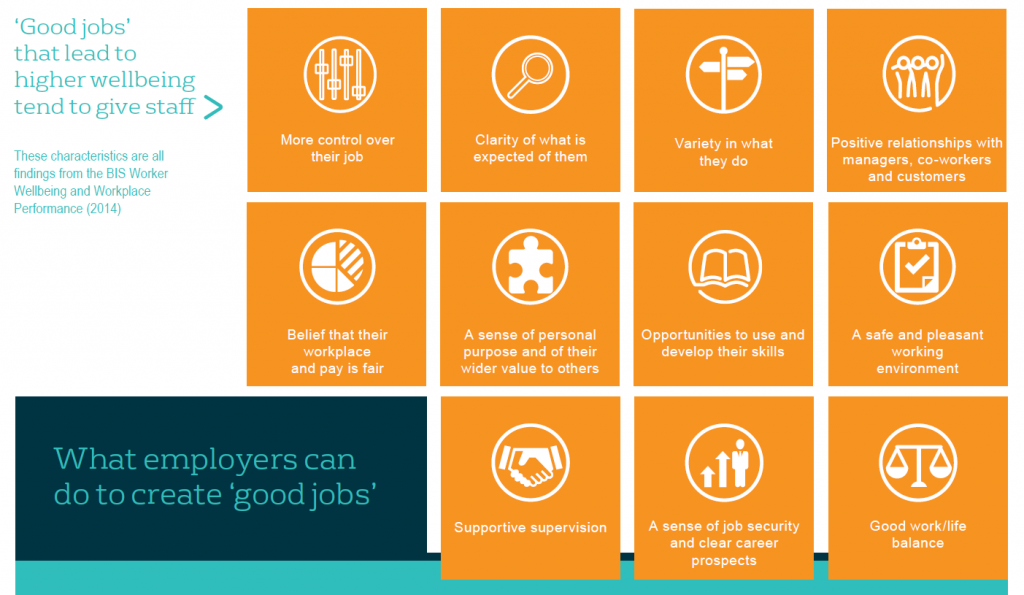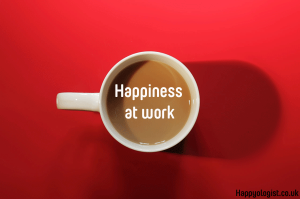Happiness at work. For some workers it is a contradiction in terms or a mirage, for other an aspiration or even reality. As today is Labour Day, it’s a good moment to answer a few questions how happiness at work can be pursued.
Happiness at work has been a powerful trend in recent years. Many companies have jumped on the bandwagon, rethinking how personnel find purpose in their work or recruiting happiness officers to organise fun activities and provide entertainment.
But what makes a happy company?
Characteristics of good jobs
As happiness at work is studied more seriously, there are more and more ideas and knowledge about what is needed to make us thrive in the work-place. The UK Business, Industry and Skills Department surveyed how employee wellbeing affects workplace performance. The survey’s 11 main takeaways on what makes a good job were summarised in the visual below by the What Works Wellbeing Center.
A lot of these elements are common sense: ownership and responsibility, variety in tasks, open communication, positive relations, learning, and a good balance between life and work. Implementation is step two, though. It requires a good company structure and the right culture to make sure they’re adequately implemented and not mere window-dressing.
- Elements of good jobs. Source: What Works Wellbeing, https://whatworkswellbeing.org/blog/what-we-know-good-work/
The business of happiness at work
Some firms endow their HR department or another function, or even a dedicated Chief Happiness Officer, to bring happiness to the work place. Others work with external consultants specialising in the science of happiness at work and implementing changes at a project basis.
One such organisation in my current base of Warsaw, is the Employer Branding Institute (EBI). Apart from assisting firms is creating happier work places, it also runs a project called Pracuję bo lubię (I work because I like it). The project aims to raise the number of employees that are happy at work. There certainly is work to do: one Gallup study found that about 87% are unhappy or unengaged at work.
Health, atmosphere, purpose and flow
I sat down with Aleksandra Grabska of EBI, who rans the project and co-wrote the report, to ask her how they evaluate happiness at work. She explained me that they broke down happiness in four dimensions:
- Health: a working culture that helps employees to live healthily. A job should not lead to too much stress, and employees should have the possibility to eat healthily. Even having a few good lunch options close to the office can contribute to happiness.
- Atmosphere: humans are social animals, and the interaction with our colleagues – with whom we spend more time than with our partners! – is important. Thus, good employers invest in team dynamics. Hence all the Chief Happiness Officers organising champaign parties – and good managers focusing on open communication in their teams.
- Purpose: ultimately, apart from basic needs and fun we also want to feel we are achieving something worthwhile. According to Aleksandra, this especially requires a bit of effort for bigger firms whose purpose is more abstract. These should make sure that employees with more technical or administrative tasks see how their support helps the firm achieves its mission. For instance, admin staff in an accountancy firm facilitate the work that accountants do in reviewing clients performance, and thus also support that those clients are well run and stable.
- Flow: a final part of the picture is how we feel those 8 hours at work. Good jobs are those that create flow, or activities that can absorb employee who are passionate about what they do.
And what about me?
But what, you might wonder, can I do to pursue happiness at work? There are a few thinks you can do. First of all, it helps to have a job in a company where you feel comfortable in the work environment and the sector. In some cases, that means simply packing up your things and leaving elsewhere.
A tool Aleksandra told me about is ‘job crafting‘, or slightly reshaping your job to match your ambitions. In many corporations, not all the content of the job is fully fixed. There will always be tasks that you can will have to take on, but many bosses are flexible enough to allow some degree of pro-activity and creativity. Volunteer to take on new projects, and try to carve out some time within your working week to do what gives you flow.
Good luck with the pursuit of happiness at work back in the office tomorrow!








